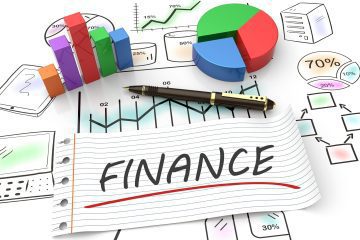Table of Contents
- Diverse Pathways in Finance Discovering Your Niche
- Key Skills for Financial Success Navigating the Competitive Landscape
- Climbing the Corporate Ladder Tips for Advancing in Finance
- Behind the Scenes Exploring Lesser-Known Finance Roles
- Networking and Advancement Building a Strong Professional Presence
- Q&A
- The Conclusion
Diverse Pathways in Finance Discovering Your Niche
In the vast landscape of financial careers, one can find diverse opportunities that cater to distinct skills, interests, and aspirations. Whether you’re drawn to the meticulous nature of accounting or the dynamic environment of investment banking, identifying your niche begins with understanding the myriad paths available. Corporate finance, for instance, offers roles in planning and analysis, where professionals shape company strategies through budgeting and forecasting. On the other hand, wealth management appeals to those who enjoy building relationships and guiding clients in achieving their financial goals.
The array of choices in finance doesn’t stop there. The flourishing field of fintech, a blend of finance and technology, attracts innovative minds eager to drive change through digital solutions. For those inclined towards data interpretation, risk management and quantitative analysis present avenues where statistical acumen is key. Some may find fulfillment in environmental finance, applying their expertise to projects that promote sustainability and renewable energy initiatives.
| Finance Niche | Key Focus |
|---|---|
| Corporate Finance | Strategic Planning |
| Wealth Management | Client Advisory |
| Fintech | Innovation & Technology |
Exploring these diverse pathways involves considering your strengths and preferences, as well as engaging in networking and continuous learning. Joining industry-specific forums or attending finance-related workshops can provide valuable insights and connections. Reflect on what excites you within the sector—do you thrive in fast-paced environments, or do you prefer roles that require careful analysis? By exploring these options, you can carve out a rewarding career tailored to your unique talents and interests.


Key Skills for Financial Success Navigating the Competitive Landscape
In the dynamic world of finance, cultivating a specific set of skills is crucial to not only thrive but also to differentiate oneself in a competitive job market. One essential skill is financial analysis. This includes the ability to interpret financial data accurately and apply it to make informed investment or management decisions. Proficient financial analysts can predict financial trends and help shape the strategic direction of their company, making them invaluable to any organization.
Another indispensable skill is effective communication. Finance professionals must translate complex financial concepts into simpler terms for stakeholders who may not have a financial background. This requires excellent verbal and written communication skills. Creating insightful reports, delivering persuasive presentations, and adeptly handling negotiations with clients or team members are part of this competency, enhancing the individual’s ability to influence corporate decisions.
Ahead of the curve is the demand for technological proficiency. Embracing technology and being comfortable with financial modeling software, data analytics tools, and blockchain are increasingly crucial in today’s finance roles. A modern financier should be adaptable to technological changes, ensuring they can harness tech advancements to optimize financial operations. Here’s a quick look at some popular tools and their relevance:
| Tool | Usage |
|---|---|
| Excel | Data analysis and financial modeling |
| Tableau | Data visualization and reporting |
| Blockchain | Secure transactions and data management |


Climbing the Corporate Ladder Tips for Advancing in Finance
Advancing in the competitive world of finance requires not just technical skills but also a strategic mindset. Building a diverse skill set is crucial for climbing the corporate ladder. Finance professionals should focus on developing both quantitative abilities and soft skills, such as communication and leadership. Pursuing advanced certifications like a Chartered Financial Analyst (CFA) or Certified Public Accountant (CPA) can also significantly enhance your credentials. Moreover, engaging in professional development opportunities, such as workshops and seminars, helps keep your knowledge current and demonstrates a commitment to growth.
- Network Strategically: Cultivating a robust network can open doors to exclusive job opportunities and mentorships. Attend industry conferences, join finance-related groups on social media, and participate in webinars to connect with industry leaders.
- Seek Mentors: Mentorship provides invaluable guidance. Seek out experienced professionals who can offer insights and advice tailored to your career goals.
- Embrace Technology: Stay ahead by mastering financial technologies and tools. Familiarity with the latest software and analytics programs can set you apart from your peers.
| Skill | Importance |
|---|---|
| Analytical Skills | High |
| Communication Skills | Medium |
| Technical Knowledge | High |
Understanding the organizational culture is another key component. Each company has its own way of conducting business and aligns its values with its mission. Actively participating in company events and understanding internal processes not only demonstrates commitment but also helps you align your professional objectives with company goals. This alignment often positions you as a reliable go-to person, paving the way for promotions and greater responsibilities. Remember, visibility within your organization is as important as external networking.


Behind the Scenes Exploring Lesser-Known Finance Roles
While most people are familiar with popular finance roles like investment banking and accounting, the industry is rich with lesser-known career paths that offer unique challenges and rewards. For individuals eager to explore opportunities beyond the traditional, positions like financial compliance analysts or risk management specialists offer a chance to dive deep into the regulatory and strategic facets of finance. These roles are essential in helping organizations navigate complex regulatory frameworks, ensuring their operations are aligned with industry standards and safeguarding against potential financial risks.
- Financial Compliance Analyst: Tasked with maintaining a company’s adherence to legal standards, compliance analysts review policies, evaluate risk exposure, and implement safeguards against unethical practices. Their job might include collaborating with legal advisors and conducting internal audits to ensure company practices meet governmental and organizational benchmarks.
- Risk Management Specialist: Focused on identifying, assessing, and prioritizing risks, this role involves devising strategies to mitigate potential financial losses. Specialists develop customized models to predict potential threats and work closely with other departments to implement these risk management plans.
| Role | Key Responsibilities | Skills Required |
|---|---|---|
| Financial Compliance Analyst | Conduct audits, analyze policies, enforce regulatory measures | Attention to detail, organizational skills, legal knowledge |
| Risk Management Specialist | Risk assessment, strategy development, threat mitigation | Analytical skills, problem-solving, decision-making |


Networking and Advancement Building a Strong Professional Presence
Establishing a robust presence in the finance industry requires more than just technical skills; it demands strategic networking and deliberate career advancement efforts. Start by actively participating in financial forums and attend industry conferences. This creates opportunities to meet fellow professionals and experts who can offer invaluable insights and potential career opportunities. Engage in meaningful conversations on platforms like LinkedIn by sharing relevant content and joining finance-related groups. This helps in expanding your network organically while positioning you as a thought leader.
- Join Professional Associations: Consider memberships in organizations like the CFA Institute or AICPA. These associations not only provide networking opportunities but also offer resources for continuous learning.
- Attend Relevant Conferences: Events such as the Financial Planning Association Conference or finance workshops can be pivotal in meeting industry leaders and peers.
- Utilize Social Media: Platforms like LinkedIn and Twitter are powerful tools for connecting with influencers and participating in industry dialogues.
Climbing the career ladder in finance often involves strategic steps and leveraging relationships. Identify mentors and sponsors within your current workplace or broader network who can provide guidance and potentially advocate for your career progression. A mentor can offer advice and insights into developing the necessary skills for advancement, while a sponsor may actively support and promote your career within influential circles. Furthermore, continually seek out and act on opportunities for professional development. Courses, certifications, and workshops tailored to finance professionals can enhance your knowledge and make you more attractive to potential employers. Below is a table that summarizes effective strategies for building a professional presence in finance:
| Strategy | Benefits |
|---|---|
| CFA Certification | Credibility and expertise recognition |
| Mentorship | Personalized career guidance |
| Networking Events | Broaden industry connections |




0 Comments